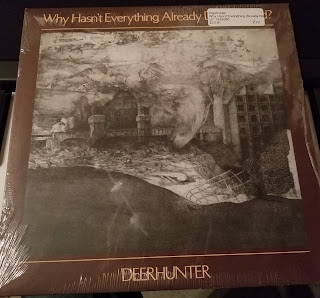Deerhunter - Why Hasn't Everything Already Disappeared?
Baudrillard. He coined the term "hyperreality." It essentially means that we cannot tell the difference between reality and simulated reality. I don't mean, and he didn't mean, a VR so realistic you live there like The Matrix, that's a naive surface interpretation. What he was really trying to get at was the facade of globalization becoming the only Truth we understand; the illusion that knowledge itself can reach completion. In short, we believe the propagandized version of reality and forget the agenda that propaganda advances.
His final posthumous book is titled Why Hasn't Everything Already Disappeared? That's also the title of Deerhunter's 2019 album. The book itself isn't the concept, the historical situation is the concept that envelopes the songs on the album. A philosopher predicting the disappearance of culture itself, but realizing that it has not happened during his lifetime. A prediction of the future in which we now live, sort of. "A sci-fi album about the present." The fight for the survival of culture is happening all around us, we see it every waking moment of the day. Baudrillard's argument was that this hyperreality leaves us vulnerable to complete psychological meltdown whenever events like 9/11, or a pandemic, or the sudden withdrawal of armed forces from another country disturb the illusion of a perfectly functioning universe, and each successive fallout will be worse. OK Computer comes to mind. I have no idea if any of that kind of mental fragility speaks for this Deerhunter album or not, i haven't listened to it yet. Let's change that.
But first, this probably unnecessary philosophical tangent. Baudrillard's ideas were accompanied by a logically increasing refutation and ultimate rejection of Smith/Marx, specifically with regard to the labor theory of value. Value, for Baudrillard, is not a quality derived from production. Rather, value itself is a semiosis dependent entirely upon the comparative value of consumption. Need and scarcity are fabricated constructs, mythologies, defined not by an abstract/inherent universal need, but by the significance of consumption inside a semiotic system. Thus, innovation and progress can never fulfill a supposed need, only exaggerate or heighten the hyperreal, and likewise the collateral damage of its disruption. This is of course the clash of ideologies themselves, and eventually culture itself will be nothing more than a commodity, in short a delusion.
Now Deerhunter.
Ho-o-o-o-oly crap, that's bleak. Ben Gibbard's a horse and buggy ride through Central Park on a sunny day compared to this. If the cutting out of a bad connection on the last track, Nocturne, doesn't leave you weeping on the floor in the fetal position, then your soul is already beyond repair. This is brutal.
Better yet, all that tangential background is totally relevant. That's the difference between hearing this as a brutal statement about how miserable these last couple years have been and "Deerhunter made a shimmery crap-pop album and i hate it." The latter being a shining example of the agonizingly vacant consumer culture itself; liking or hating this album is nothing more than a status symbol.
It's not a constructed album, though. It is very much a coincidentally well designed take-out box, but magically enough it's a superb one. Bits of the anger and desperation shine through, but the presentation mutes all but the sharpest of fangs, and even those lack most of their real venom. It must feel like agony on the inside. It must because it does.
Reading through the descending rankings at anydecentmusic.com/review/9671/Deerhunter-Why-Hasnt-Everything-Already-Disappeared.aspx is like watching the spectrum unfold in front of your eyes. If i did "/10," this one's an 8.
Then again, i have that wider philosophical context this album references, but i don't have any preconceived perception of Deerhunter beyond their status as Indie Darlings. I've heard about them, but this is my first experience of them. Any attempt to change that now has me working backward and remembering the future.
Is the hypothetical 9 i'd give that Nektar album a valid assessment of their respective consumptive values? I dunno. I do know pitting this against SPK's Machine Age Voodoo and BTBAM's Automata I&II would be a much more fruitful compare/contrast. They all have a lot more in common than you might at first expect.
Instead, i did some more digging and Bradford Cox has an interesting approach to songwriting. It's a zone out and end up creating 5 or 6 songs all in one train of thought, and that actually goes a long way to explaining the serendipitous feel about this album. For all the production facepaint, this is not a scripted, meticulous sounding album. He's just as surprised as you are at what the band produces from his ideas, and this very much sounds like a lonely miserable tirade through a surprisingly soundproof 4th wall.
I love it, your milage may vary.



Comments
Post a Comment